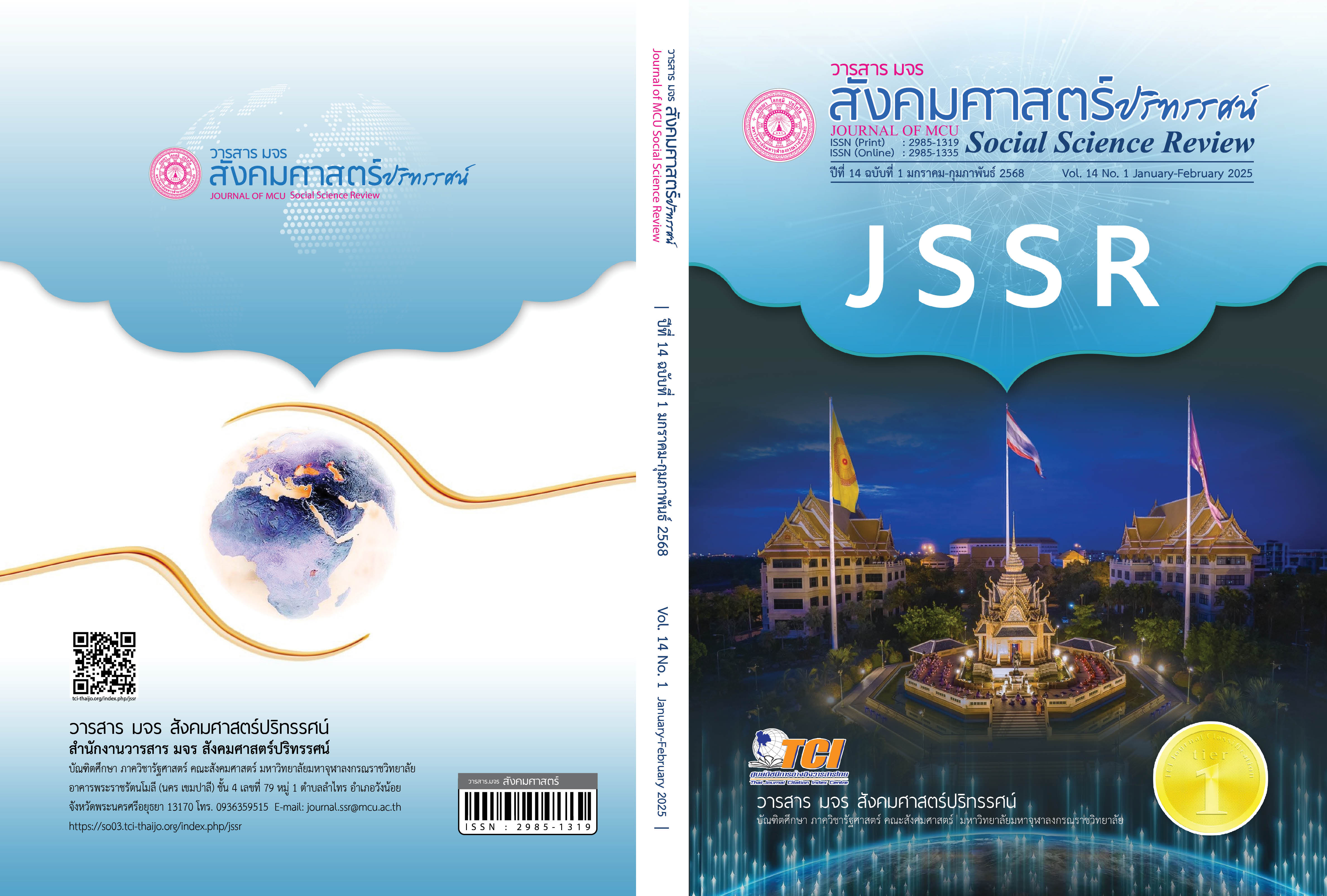เกย์วัยเกษียณที่มีความยั่งยืนทางการเงิน : การสร้างความหมาย จากการต่อสู้กับวาทกรรมทุนนิยม
คำสำคัญ:
เกย์วัยเกษียณ, ความยั่งยืนทางการเงิน, การต่อสู้กับวาทกรรม, วาทกรรมทุนนิยมบทคัดย่อ
บทความวิจัยนี้มีเพื่อศึกษาประสบการณ์ของเกย์วัยเกษียณที่ให้ความหมายต่อความยั่งยืนทางการเงินจากการต่อสู้กับวาทกรรมทุนนิยม โดยเป็นการวิจัยเชิงคุณภาพในกระบวนทัศน์เชิงวิพากษ์ การรวบรวมข้อมูลใช้วิธีการศึกษาเรื่องเล่ามีแนวทางการพูดคุยในลักษณะคำถามแบบกึ่งโครงสร้าง เลือกผู้ให้ข้อมูลด้วยวิธีการแบบเฉพาะเจาะจงผ่าน Gate keeper เป็นผู้ให้ข้อมูลที่ระบุอัตลักษณ์แห่งตัวตนว่าเป็นเกย์และสามารถให้ความหมายของคำว่า ความยั่งยืนทางการเงิน มีอายุ 65 ปีขึ้นไป จำนวน 15 คน ใช้การวิเคราะห์ข้อมูลเพื่อสร้างเรื่องเล่าผ่านการวิเคราะห์แก่นสาระ ผ่านแนวคิดของ Micheal Foucault เรื่องการสร้างอัตลักษณ์ โดยเชื่อว่า
อัตลักษณ์สร้างโดยอำนาจของความรู้ ที่ทำงานผ่านภาคปฏิบัติการทางวาทกรรม หรือกล่าวได้ว่าเป็นการสร้างตัวตนผ่านการต่อสู้กับวาทกรรม
ผลการวิจัยพบว่า การให้ความหมายต่อความยั่งยืนทางการเงิน ซึ่งเป็นผลผลิตจากการเกย์ต่อสู้กับวาทกรรมทุนนิยม มีลักษณะสำคัญ 4 ประเด็น ดังนี้ เกย์ผู้มีอิสระทางการเงิน เกย์ผู้สร้างตัวตนให้เป็นเสาหลักของครอบครัว เกย์ผู้สร้างทางเลือกในการหาเงิน และเกย์ผู้มีมนุษยสัมพันธ์ในการทำงาน
เอกสารอ้างอิง
เฉลิมขวัญ เมฆสุข และพิทักษ์ ศิริวงศ์. (2561). คนข้ามเพศ : การใช้ชีวิตคู่ การสร้างครอบครัว และการเลี้ยงดูบุตร. วารสารวิจัยมหาวิทยาลัยเทคโนโลยีราชมงคลศรีวิชัย, 10(1), 37-51.
ชัยณรงค์ เครือนวน. (2558). ปฏิบัติการและการต่อสู้ทางวาทกรรมในการพัฒนาอุตสาหกรรม: ศึกษากรณีการพัฒนาอุตสากรรมภายใต้ตัวแบบมาบตาพุด. วารสารการเมือง การบริหาร และกฎหมาย, 7(2), 223-245.
ชาญณรงค์ ชัยพัฒน์. (2563). ความยั่งยืนทางการเงินส่วนบุคคลและพฤติกรรมการออมการลงทุนเพื่อวัยเกษียณ (ดุษฎีนิพนธ์ปรัชญาดุษฎีบัณฑิต สาขาวิชาเศรษฐศาสตร์). กรุงเทพฯ: มหาวิทยาลัยศรีนครินทรวิโรฒ.
ชุติภาส อุดมสุด. (2560). การศึกษาทัศนคติของกลุ่มชายรักชาย (เกย์) ที่มีผลต่อการเลือกซื้อเสื้อผ้าแบรนด์เนมเพื่อการส่งเสริมสถานะทางสังคม (การค้นคว้าอิสระวิทยาศาสตรมหาบัณฑิต สาขาวิชาาการบริหารการตลาด). กรุงเทพฯ: มหาวิทยาลัยธรรมศาสตร์.
ตัสนีมซ์ ศรีรัตน์. (2562). เหตุผลในการเลือกอาชีพช่างตัดผมมืออาชีพของกลุ่มคนเจนเนอเรชั่นวายกรณีศึกษาช่างตัดผมมืออาชีพ อำเภอหาดใหญ่ จังหวัดสงขลา (สารนิพนธ์บริหารธุรกิจมหาบัณฑิต สาขาวิชาบริหารธุรกิจ). สงขลา: มหาวิทยาลัยสงขลานครินทร์.
ทิพย์สุดา พุฒจร. (2554). ความท้าทายของชุมชนท่ามกลางการพัฒนาสู่ความทันสมัย. วารสารศิลปศาสตร์ มหาวิทยาลัยสงขลานครินทร์, 3(2), 72-87.
ธนา ร่างน้อย. (2566). สนามวาทกรรม “ความผิดเพศ” และความเกลียดชังทางเพศวิถีที่มีต่อกลุ่มเกย์เพศชายกลุ่มต่าง ๆ ภายใต้บริบท “สังคมนิยมชาย” ในประเทศไทย ในศตวรรษที่ 21 (ดุษฎีนิพนธ์ศิลปศาสตรดุษฎีบัณฑิต สาขาวิชาอาชญาวิทยาและงานยุติธรรม). กรุงเทพฯ: จุฬาลงกรณ์มหาวิทยาลัย.
ธนาคารระหว่างประเทศเพื่อการบูรณะและพัฒนา. (2561). การมีส่วนร่วมทางเศรษฐกิจของกลุ่ม LGBTI ในประเทศไทย. สืบค้น 5 พฤษภาคม 2567, จาก https://shorturl.asia/zX5nP
นฤรณัณ อินทยศ. (2565). แม่ที่มีลูกเป็นกะเทย: การต่อรองอัตลักษณ์ความเป็นแม่ภายใต้เพศสถานะและเพศวิถีในสังคมไทย (วิทยานิพนธ์ศิลปศาสตรมหาบัณฑิต สาขาวิชาสตรี เพศสถานะ และเพศวิถีศึกษา). กรุงเทพฯ: มหาวิทยาลัยธรรมศาสตร์.
เบญจรงค์ ถิระผลิกะ และคณะ. (2565). การสังเคราะห์ภาพและแก่นสาระของชายรักชายที่ปรากฏในงานวิจัยในประเทศไทย : การสังเคราะห์งานวิจัยด้วยการทบทวนวรรณกรรมอย่างเป็นระบบ. วารสารศรีนครินทร์วิโรฒ วิจัย และพัฒนา (สาขามนุษยศาสตร์ และสังคมศาสตร์), 14(28), 56-69.
เบญจวรรณ อุปัชฌาย์. (2561). แนวคิดเรื่องตัวตนที่รู้คิดและกระบวนการสร้างตัวตนของมิเชล ฟูโกต์. วารสารวิชาการมนุษยศาสตร์และสังคมศาสตร์โรงเรียนนายร้อยพระจุลจอมเกล้า, 5(5), 159-208.
ปัญจภรณ์ ยะเกษม และพัชราภัณฑ์ ไชยสังข์. (2557). ประสบการณ์การเป็นแม่ของวัยรุ่น.วารสารวิจัยทางวิทยาศาสตร์สุขภาพ, 8(1), 28-34.
ปิยลักษณ์ โพธิวรรณ์ และคณะ. (2554). ร้านเสริมสวย : พื้นที่การสร้างตัวตนของคนข้ามเพศ. วารสารสังคมลุ่มน้ำโขง, 7(2), 75-88.
_____. (2554). คนข้ามเพศ : ตัวตน วัฒนธรรมย่อย และพื้นที่ทางสังคม. วารสารดำรงวิชาการ, 10(1), 98-125.
พัฒนภาณุ ทูลธรรม. (2563). ปริทรรศน์การวิจัยแนวเรื่องเล่าทางสังคมศาสตร์สู่งานสังคมสงเคราะห์. วารสารวิชาการคณะมนุษย์ศาสตร์และสังคมศาสตร์ มหาวิทยาลัยมหาสารคาม, 11(1), 89-106.
รุจินันท์ วาธีวัฒนารัตน. (2566). มาตรการทางกฎหมายเกี่ยวกับความกตัญญูของประเทศไทย. วารสารวิชาการวิทยาลัยสันตพล, 9(2), 147-155.
วฤษสพร ณัฐรุจิโรจน์. (2560). ครอบครัวทางเลือกและการคงอยู่ของสถาบันครอบครัว. วารสารมหาวิทยาลัยศิลปากร, 10(2), 1817-1827.
วารี ปรีชาปัญญากุล. (2563). ภาษาและอัตลักษณ์ของพิธีกรเพศที่สามที่ปรากฏผ่านรายการโทรทัศน์. วารสารวิทยาการจัดการ มหาวิทยาลัยราชภัฏเชียงราย, 15(2), 143-163.
Carland-Echavarria, P. (2022). We do not live to be productive: LGBT activism and the politics of productivity in contemporary Japan. The Asia-Pacific Journal, 20(2), 1-24.
Danaher, G. et al. (2000). Understanding Faucault. Australia: Allen & Unwin.
Demetriou, O. (2016). Counter-conduct and the everyday: Anthropological engagements with philosophy. Global Society, 30(2), 218-237.
Swiftand, H. J. et al. (2016). The risks of ageism model: How ageism and negative attitudes toward age can be a barrier to active aging. Social Issues and Policy Review, 11(1), 195-231.
ดาวน์โหลด
เผยแพร่แล้ว
รูปแบบการอ้างอิง
ฉบับ
ประเภทบทความ
สัญญาอนุญาต
ลิขสิทธิ์ (c) 2024 วารสาร มจร สังคมศาสตร์ปริทรรศน์

อนุญาตภายใต้เงื่อนไข Creative Commons Attribution-NonCommercial-NoDerivatives 4.0 International License.
เพื่อให้เป็นไปตามกฎหมายลิขสิทธิ์ ผู้นิพนธ์ทุกท่านต้องลงลายมือชื่อในแบบฟอร์มใบมอบลิขสิทธิ์บทความให้แก่วารสารฯ พร้อมกับบทความต้นฉบับที่ได้แก้ไขครั้งสุดท้าย นอกจากนี้ ผู้นิพนธ์ทุกท่านต้องยืนยันว่าบทความต้นฉบับที่ส่งมาตีพิมพ์นั้น ได้ส่งมาตีพิมพ์เฉพาะในวารสาร มจร สังคมศาสตร์ปริทรรศน์ เพียงแห่งเดียวเท่านั้น หากมีการใช้ภาพหรือตารางหรือเนื้อหาอื่นๆ ของผู้นิพนธ์อื่นที่ปรากฏในสิ่งตีพิมพ์อื่นมาแล้ว ผู้นิพนธ์ต้องขออนุญาตเจ้าของลิขสิทธิ์ก่อน พร้อมทั้งแสดงหนังสือที่ได้รับการยินยอมต่อบรรณาธิการ ก่อนที่บทความจะได้รับการตีพิมพ์ หากไม่เป็นไปตามข้อกำหนดเบื้องต้น ทางวารสารจะถอดบทความของท่านออกโดยไม่มีข้อยกเว้นใดๆ ทั้งสิ้น





